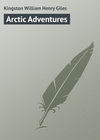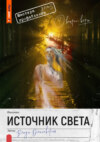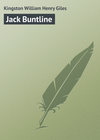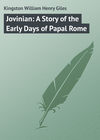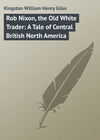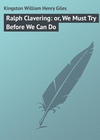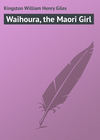Kitobni o'qish: «Arctic Adventures»
Chapter One
I had often dreamed of icebergs and Polar bears, whales and rorquals, of walruses and seals, of Esquimaux, and Laplanders and kayaks, of the Aurora Borealis and the midnight sun, and numerous other wonders of the arctic regions, and here was I on board the stout ship the Hardy Norseman, of and from Dundee, Captain Hudson, Master, actually on my way to behold them, to engage in the adventures, and perchance to endure the perils and hardships which voyagers in those northern seas must be prepared to encounter.
Born in the Highlands, and brought up by my uncle, the laird of Glenlochy, a keen sportsman, I had been accustomed to roam over my native hills, rifle in hand, often without shoes, the use of which I looked upon as effeminate. I feared neither the biting cold, nor the perils I expected to meet with. I had a motive also for undertaking the trip. My brother Andrew had become surgeon of the Hardy Norseman and we were both anxious to obtain tidings of our second brother David, who had gone in the same capacity on board the Barentz, which had sailed the previous year on a whaling and sealing voyage to Spitzbergen and Nova Zembla, and had not since been heard of. I was younger than either, and had not yet chosen my future profession; though, having always had a fancy for the sea, I was glad of an opportunity of judging how near the reality approached my imaginings, besides the chief motive which had induced me to apply to our old friend Captain Hudson for leave to accompany Andrew.
I had undertaken to make myself generally useful, to act as purser and captain’s clerk, to assist in taking care of the ship when the boats were away, and to help my brother when necessary, so that I was generally known as the “doctor’s mate.”
The Hardy Norseman’s crew consisted of Scotchmen, Shetlanders, Orkney men, Norwegians, and Danes. The most notable among them was Sandy Steggall, the boatswain, a bold harpooner, who possessed a tongue – the second mate used to say – as long as a whale spear, which he kept wagging day and night, and I got no little insight into the particulars of our future life by listening to his yarns.
We had not been long at sea, when one night, it having fallen calm, I went forward, where I found the watch on deck assembled, Sandy and two or three others holding forth in succession, though the boatswain, by virtue of his rank, claimed the right of speaking the oftenest. Wonderful were Sandy’s yarns. He told how once he had been surprised by a bear, when, as he was on the point of being carried off, he stuck his long knife into bruin’s heart, and the creature fell dead at his feet. On another occasion, when landing on the coast of Spitzbergen, he and his companions found a hut with three dead men within, and others lying in shallow graves, the former having buried the latter, and then died themselves, without a human soul near to close their eyes. Again, he had come upon the grave of an old shipmate who had been dead twenty years, whose features, frozen into marble, looked as fresh as when first placed there, the only change being that his hair and beard had grown more than half a fathom in length.
Yarn after yarn of shipwreck and disaster was spun, until I began to wish that David had not gone to sea, and that we could have avoided the necessity of going to look for him.
With the bright sun-light of the next morning I had forgotten the more sombre hues of his narratives, and looked forward with as much eagerness as at first to the adventures we might meet with.
That afternoon I had occasion to go into the hold, accompanied by the boatswain and another man carrying a lantern, to search for some stores which ought to have been stowed aft, when, as I was looking about, I fancied I heard a moan. I called the attention of the boatswain to it. We listened.
“Bring the light here, Jack!” he said to the seaman, and he made his way in the direction whence the sound proceeded. Presently, as he stooped down, I heard him exclaim —
“Where do you come from, my lad?”
“From Dundee. I wanted to go to sea, so I got in here,” answered the person to whom he spoke, in a weak voice.
“Come out then and show yourself,” said Sandy.
“But that’s more than I can do!” was the answer.
“I’ll help you then,” returned the boatswain, dragging out a lad about my own age, apparently so weak and cramped as to be utterly unable to help himself.
“We must carry you to the doctor, for we don’t want to let you die, though you have no business to be here,” observed Sandy, with a look of commiseration. He afterwards remarked to me, “I did the same thing myself, and I couldna say anything hard to the puir laddie.”
The boatswain at once carried the young stranger up on deck. The captain had begun to rate him well for coming on board without leave, but seeing that he was ill fit to bear it, he told me to summon the doctor, who was below.
I called Andrew, who returned with me to the deck.
“What’s your name?” asked the captain, while Andrew was feeling his pulse.
“Ewen Muckilligan,” was the answer.
As I heard the name, I looked more particularly than before at the young stowaway’s features, and recognised an old schoolfellow and chum of mine. Both his parents being dead, he had been left under charge of some relatives who cared very little for him.
“He only requires some food to bring him round, but the sooner he has it the better,” observed Andrew.
With the captain’s permission, I got him placed in my berth, where, after swallowing a basin of broth, he fell asleep. By frequent repetition of the same remedy, he was able, after a couple of days, to stand on his feet, when the captain administered a severe lecture, telling him that he must send him back by the first vessel we might fall in with. Ewen, however, begged so hard to remain, that the captain promised to consider the matter.
“I may as well make a virtue of necessity, for we are not at all likely to fall in with any homeward-bound craft,” he afterwards observed to Andrew.
Hearing this, I told Ewen that he might make his mind easy, that if he had determined to be a sailor he had now an opportunity of learning his profession, though he would gain his experience in a very rough school.
As Ewen was in every sense a gentleman, he was allowed to mess with us; for which permission I was very grateful to Captain Hudson, as most captains would have sent him forward to take his chance with the men. He soon proved that he intended to adhere to his resolution. On all occasions he showed his willingness to do whatever he was set to, while he was as active and daring as any one on board.
We were forward one evening, talking to the men, after they had knocked off work, the second mate having charge of the deck, the captain, first mate, and Andrew being below, when it was suggested that we two should try who could first reach the main truck. One was to start from the fore-top, the other from the mizen cross-trees. We were to come down on deck and then ascend the mainmast. We cast lots. It was decided that Ewen should start from the fore-top, I from the latter position. The second mate liked the fun, and did not interfere. We took up our positions, waiting for the signal – the wave of a boat-flag from the deck. The moment I saw it, without waiting to ascertain what Ewen was about, I began to run down the mizen shrouds; he in the meantime descended by the back stay and was already half up the main rigging on the port side before I had my feet on the ratlines on the starboard side. When once there I made good play, but he kept ahead of me and had already reached the royal-mast, swarming up it, before I had got on the cross-trees. As he gained the truck he shouted “Won! won!”
I slid down, acknowledging myself defeated, and feeling not a little exhausted by my exertions. Judging by my own sensations, I feared that he might let go and be killed. I dared not, as I made my way down, look up to see what he was doing. Scarcely had I put my foot on deck than he stood by my side, having descended by the back stay.
The crew applauded both of us, and Ewen was greatly raised in their estimation when they found that he had never been before higher than the maintop.
Sandy Steggall, the boatswain, however, who soon afterwards came on deck, scolded both of us for our folly, and rated the men well for encouraging us.
“What would ye have said if these twa laddies had broken their necks, or fallen overboard and been drowned?” he exclaimed.
We had, I should have said, four dogs on board, all powerful animals; two were Newfoundland dogs, one was a genuine Mount Saint Bernard, and a fourth was a mongrel, a shaggy monster, brought by our captain from Norway. They were known respectively as Bruno, Rob, Alp and Nap.
We had crossed the Arctic circle, sighted the coast of Norway; and, with the crow’s nest at the mast head, and the boats all ready, we were approaching the latitude where we might expect at any hour to fall in with ice. We had already seen several rorquals or finners; but those mighty monsters of the deep, the largest species of the whale, it was considered unadvisable to attack, as they afford comparatively little oil and are apt to turn upon the boats and destroy them.
“There she spouts! There she spouts!” shouted the captain from the crow’s nest, which he or one of the mates had occupied continually.
In a few minutes the boats were in the water, and the watch below came tumbling on deck, carrying their clothes with them. As I could pull a good oar, I got a seat in one of the boats. We were in chase of the true whale, which can easily be distinguished from the rorqual by the mode of its spouting. Marking the spot where it sounded, we had hopes of getting up to it the next time it should rise to the surface.
We lay on our oars waiting anxiously for its appearance. Presently up it came half a mile off. We gave way with a will. As we approached the monster, our harpooner, Sandy, throwing in his oar, got his gun ready. He fired, and in a moment we were fast. The sea around us was broken into foam, and we were covered with spray as the creature dived, dragging out the line which flew over the bollard at a rate which would soon have set it on fire had not water been thrown upon it. Immediately a staff, with the Jack at the end, was raised in our boat as a signal that we were fast, and the other two boats came pulling up to our assistance. Two lines were drawn out, and the boat was dragged along at a rapid rate, sending the water flying over her bows. At length the pace slackened and we were able to haul in our line until the whole of one and part of the other was again coiled away in the tubs. By this time the other boats had reached us. First one on one side, then on the other, got close enough to fire two more harpoons into the body of the monster, besides which several lances were darted into it. Again the whale dived, leaving the surface covered with blood and oil, but it was only for a short time. Now again rising, she lay almost motionless, while we pulled up and plied her with our deadly lances, trying to find out the most vital parts. Then there came a cry of “Back! back! all of you!”
We had barely time to escape from beneath her flukes, with which she furiously lashed the water, until, her strength exhausted, she floated a lifeless mass.
A jack was stuck into her body and we made chase after a second whale which had just before appeared, and after a pretty severe fight we succeeded in killing it. We had now to tow our two prizes alongside the ship, already a considerable distance off, the wind being too light to enable her to beat up to us. As only one of the whales could be brought alongside at a time, the last we killed was taken in tow by the other boats, while we remained with the first which we had struck.
“Come, lads,” said Sandy, “we will take our fish in tow, and get as near the ship as we can. The weather looks a bit threatening, and the sooner we are alongside the better.”
We did as he advised, though we made but little progress. We had not gone far when another whale was seen spouting in an opposite direction to the ship. The temptation to try to kill it was too great to be resisted, and, regardless of the threatening look of the weather, casting off from our prize we made chase. The whale sounded just before we got up to her, but we knew she would rise to the surface again before long, and we lay on our oars waiting for her appearance.
“There she spouts, there she spouts!” cried Sandy, and we saw, not a quarter of a mile off, our chase.
Again we gave way. As we got close to the monster Sandy stood up with his gun ready. He fired, following up his shot with his hand harpoon. The lines ran out at a rapid rate until the ends were reached and we had no others to bend on.
Instead of sounding, the whale swam along the surface, dragging the boat after her right in the wind’s eye, while the foam in thick masses flew over us. The sea was getting up, and soon not only spray but the tops of the waves came washing over the gunwale. Still our only chance of winning the prize was to hold on, and we hoped, from the exertions the whale was making, that its strength would soon be exhausted. I looked astern. The ship was nowhere to be seen, nor could I distinguish the flag of the other whale. Our position was critical, and we had to depend entirely upon ourselves. At length the whale began to slacken its speed, and we began to haul in the lines. Sandy got another gun ready, and had half-a-dozen lances at hand to dart into the back of the monster when we should get up to it. We were within half-a-dozen fathoms when, suddenly raising its huge flukes, down it went again, dragging out the lines.
Suddenly the man whose business it was to attend to the coil of the hand harpoon gave a loud cry. Before anyone could stop him he was overboard, disappearing in an instant under the water. It was no use cutting the line, and, unless by a miracle the whale should return to the surface, his fate was sealed. Out ran the lines, but a few fathoms remained in the tubs.
“Get the axe ready, Tom,” said Sandy to the man who had taken the other poor fellow’s place. In vain he attempted to take a turn round the bollard, to check the monster’s descent; each time that he did so the bows dipped, and it seemed as if the boat must inevitably be drawn down, but as he let the line out her bows rose. Still the hope of obtaining the whale made him hold on. We might also recover the body of our shipmate; that he should be alive we knew was impossible. The line ran out, it was near the bitter end. I sprang to the after-part of the boat to assist in counter-balancing the pressure forward. But this did not avail, already the water was rushing over the bows. Two sharp blows were given. The whale was loose. We might yet, however, recover the lines, as the wounds the monster had received must ultimately prove mortal.
Again we took to our oars to keep the boat’s head to the sea, while we watched for the reappearance of the whale which we knew must soon rise to the surface. We had been too eagerly engaged to pay attention to the appearance of the weather. It had now, we found, become very much worse than before. Even should we kill the whale we could not hope to tow it to the ship. With bitter disappointment we had to acknowledge that our shipmate’s life had been uselessly lost and our own labour thrown away, while we could only hope against hope that the weather would again moderate and that we should fall in with the whale we had before killed.
We had now to consider our own safety, and to try to get back to the ship. We knew that she would have beat up to the boats which had the whale in tow. We had the wind in our favour, but to run before the fast rising seas would soon be perilous in the extreme. It must be done, however, for we had come away without food or water, and hunger and thirst made us doubly anxious to get on board.
Already the sun had set. We had been a far longer time away than we had supposed. Night came down upon us. The boat’s compass feebly lighted by the lantern would, however, enable us to steer a proper course. We bent to our oars, but, unaccustomed to pull in so heavy a sea, I had great difficulty in keeping mine moving. Every instant it seemed as if we must be overwhelmed by the foaming billows which rolled up astern.
Sandy had taken his place at the steering oar, and with cheering words urged us to continue our exertions; but all hands by this time were pretty well knocked up with what we had previously gone through.
We tugged and tugged away; now a sea roared up on one side, now on the other; now we plunged down into a deep gulf from which it seemed as if we should never rise. I had supposed it impossible that a boat could live in such tumultuous waters. Not a star could be discovered over head, while around we could only dimly discern dark liquid masses capped with hissing foam. How earnestly I longed for daylight and quiet, and to be once more on the deck of our ship! I knew too how anxious my brother would be. Though tumbled and tossed, the boat still continued to float. Hour after hour passed by, they seemed to be days or weeks. We had been pulling I fancied all night, and expected daylight every moment to appear, when Sandy exclaimed —
“Hurrah boys, there’s the ship’s light. We shall get safe on board now.”
Although we could see the ship’s light, we could not be seen from her deck, and she might be standing away from us. Sandy anxiously watched the light, then altered our course more to the eastward, whereby the sea being brought on our beam rendered our condition even more dangerous than before. Sandy assured us, however, that we were getting nearer; and at last, believing that we might be heard, we all shouted together at the top of our voices, forgetting that the rattling of the blocks and dash of the sea against the sides of the ship would have rendered our cries inaudible. I had for long been pulling on mechanically, scarcely knowing what I was about, when I heard Sandy again shout out, “Heave lad, heave,” and looking round I saw the bowman standing up with a rope in his hand. It had been hove to him, but the end must have been slack. We had now to regain the ship which was flying from us, but could that be done, I asked myself.
Again Sandy cheered us up by exclaiming, “She’ll heave to, lads; never doubt it, she’ll heave to.”
Of that I feared there was but little chance, for her dark hull quickly again disappeared, and I could no longer see even the least glimmer of light. Sandy, however, declared that he could, and on we pulled as before. I should have said that we passed another long hour before we once more saw the hull of the ship, and her tall masts swaying to and fro against the sky. It was no easy matter to get alongside, half full of water as was our boat. Thanks to the skill of Sandy, we at length succeeded in hooking on, and the boat was hoisted on board, by which time I was more dead than alive.
My brother and Ewen carried me below, and I was speedily restored by a basin of hot broth. Ewen had begun to tell me what had happened to the other boats and the whale, when, eager as I was to know, I dropped off fast asleep.
In the morning, when I awoke, I found a furious gale raging, and the ship hove to. It was a mercy we had got on board when we did, for if not we should in all probability have been lost. Andrew told me that the whale had been towed up alongside, but that, before half the blubber had been cut off, they had been compelled to cast it adrift. The captain intended to wait where we were in the hopes of again getting hold of it, and of picking up the other whale we had killed, and perhaps also the one we had wounded.
I had now to learn what a down-right gale at sea really is. I had thought it would be good fun, but I found it very much the contrary. The stout ship was tossed about like a shuttle-cock; the masts, yards, bulkheads, and every timber in her, creaked and groaned; the leaden seas capped with foam, now rose high above the bulwarks, now sank down forming a yawning gulf, while the stout ship was tossed from one wave to the other like a shuttle-cock. As my duty did not require me to be on deck, I lay down, fearfully tired, intending to go to sleep; but, before I dropped off, the captain came into his cabin to look at his chart. I asked him to tell me our position. We had been drifting some hours to the northward, and Bear Island, which lies between Spitzbergen and Norway, was not far off.
While he was sitting at the table with his compasses in his hand, I felt a sudden shock, and, though for an instant the ship appeared to be motionless, she trembled throughout every timber. Then came a sound like the roar of thunder, followed by a fearful crashing and rending of planks, while a sudden heave sent me and everything loose in the cabin to leeward.
The captain rushed on deck, and I sprang up after him. My first impression was that the ship was going down, and that the waves were already rolling over her.
A tremendous sea had struck her on the beam and came pouring down on our deck like a cataract sweeping all before it. Wreck and destruction met my view. The quarter-deck was cleared of rails and bulwarks, stanchions, binnacle, and the greater portion of the wheel, while one of the quarter boats, having been torn away from the davits, the wreck hung in two fragments battering against the side.
A piercing shriek reached my ear. It rose from a poor fellow whom I could see floating away to leeward on the binnacle, well knowing that no human power could assist him. Another also who had been on deck was missing, struck probably by fragments of bulwarks, and carried away.
The captain took in at a glance the state of things, and then issuing his orders in a firm tone, raised confidence in the men. A long tiller was shipped to replace the shattered wheel. The wreck was cleared. Spars were lashed to the stanchions to serve as bulwarks, and in a wonderfully short time comparative order was restored.
